Our Library
Explore our publications, from research papers and series to educational materials, covering all aspects of conflict transformation and peace promotion.
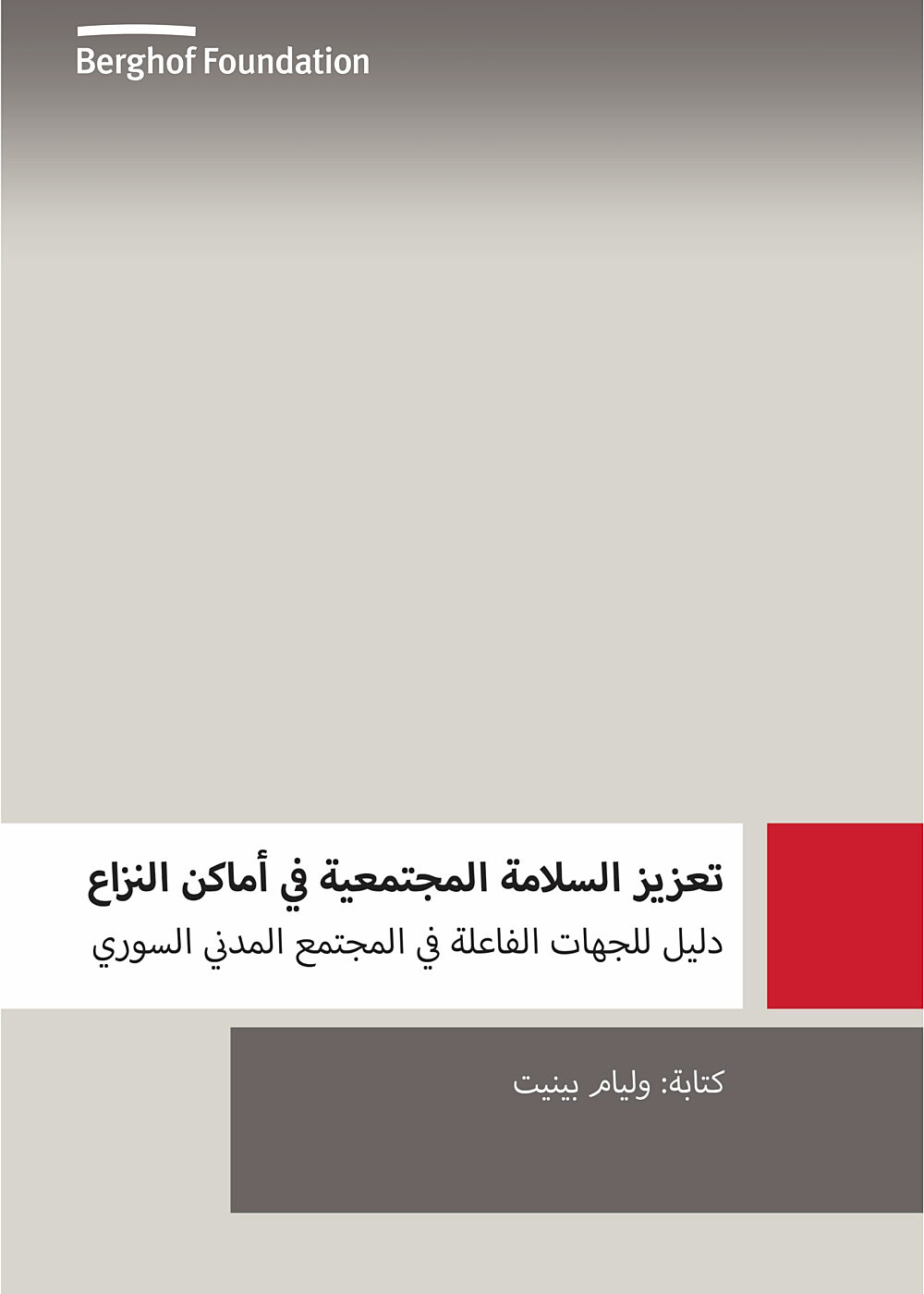
تعزيز السلامة المجتمعية في أماكن النزاعدليل للجهات الفاعلة في المجتمع المدني السوري كتابة : وليام بينيت
قد صُمم هذا الكتيب لمساعدة الجهات الفاعلة في المجتمع المدني في أماكن النزاع على توفير السلامة لمجتمعاتهم. وهو يحدد المبادئ الرئيسية لنهج سلامة المجتمع ويقدم إرشادات عملية بشأن كيفية تحديد التحديات الأمنية وكيفية تنفيذ استراتيجيات لمواجهتها. وقد تم إعداد هذا الكتيب في الأصل لجهات فاعلة في المجتمع المدني في سوريا، ولكن يمكن استخدامه أيضاً في سياقات أخرى. والدليل متاح أيضا باللغة الإنجليزية.
- Year2019
- Author(s)Will Bennett
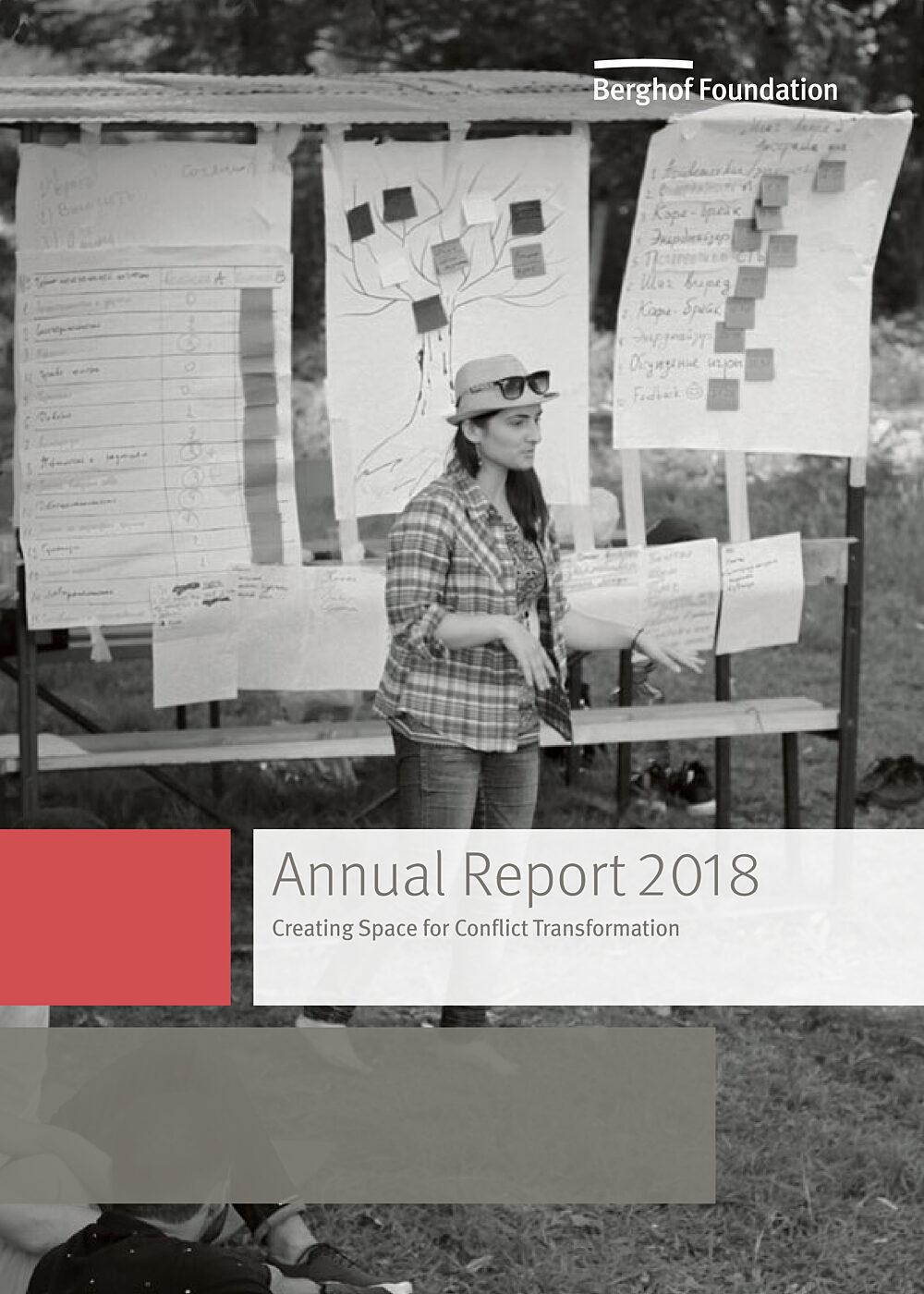
Berghof Foundation Annual Report 2018
The annual report will present you with an insight into the broad spectrum of our work in 2018.
- Year2019
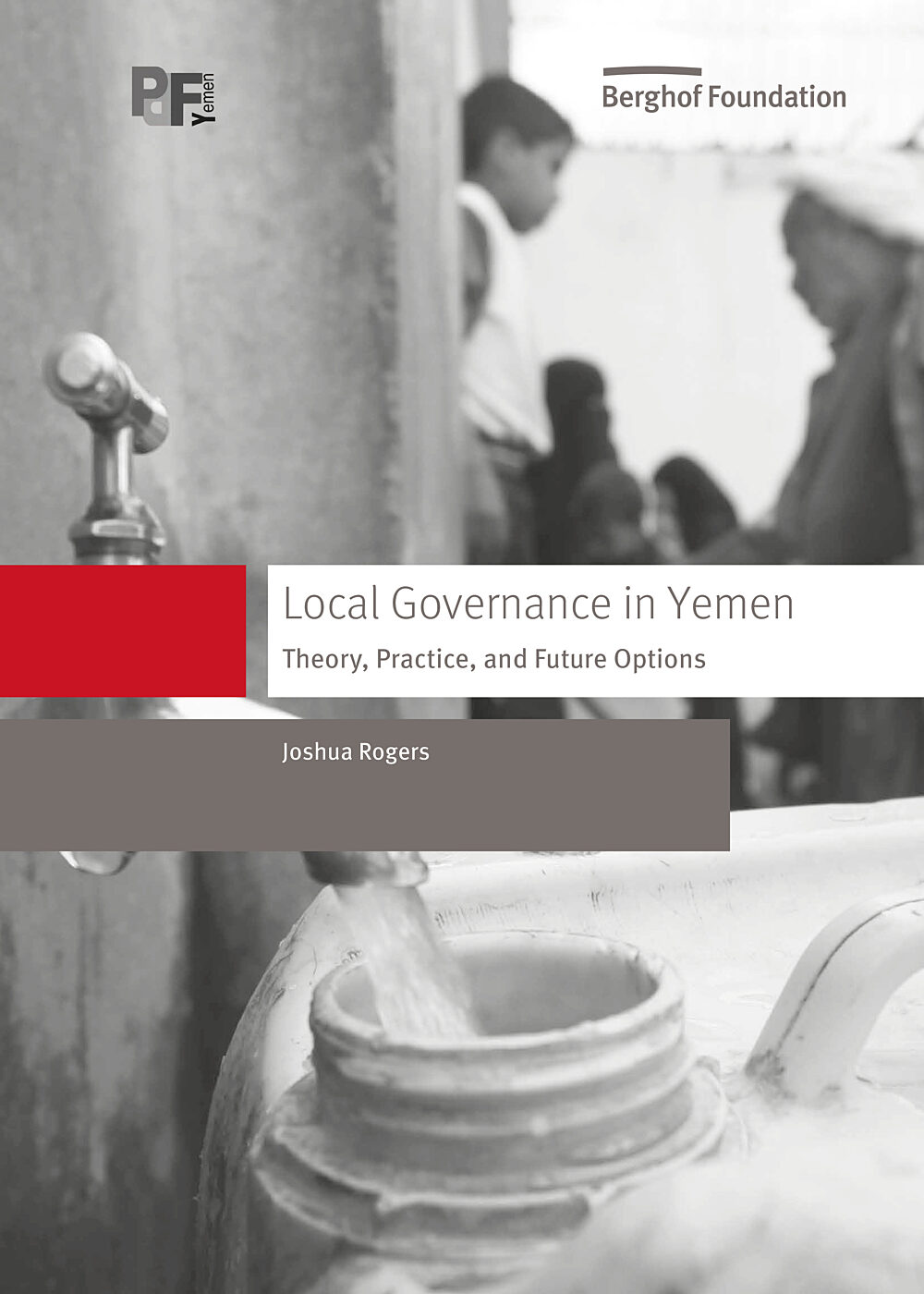
Local Governance in YemenTheory, Practice, and Future Options
Over the course of several years, the Berghof Foundation and the Political Development Forum (PDF) have focused on strengthening inclusive local governance in Yemen. This work focuses both at the local level in Hadhramawt and Dhamar and at the national level, to improve inclusivity, relaunch the local political process, and engage a broad range of stakeholders in discussions about the current challenges and potential future shape of local governance arrangements in Yemen.
- Year2019
- Author(s)Joshua Rogers
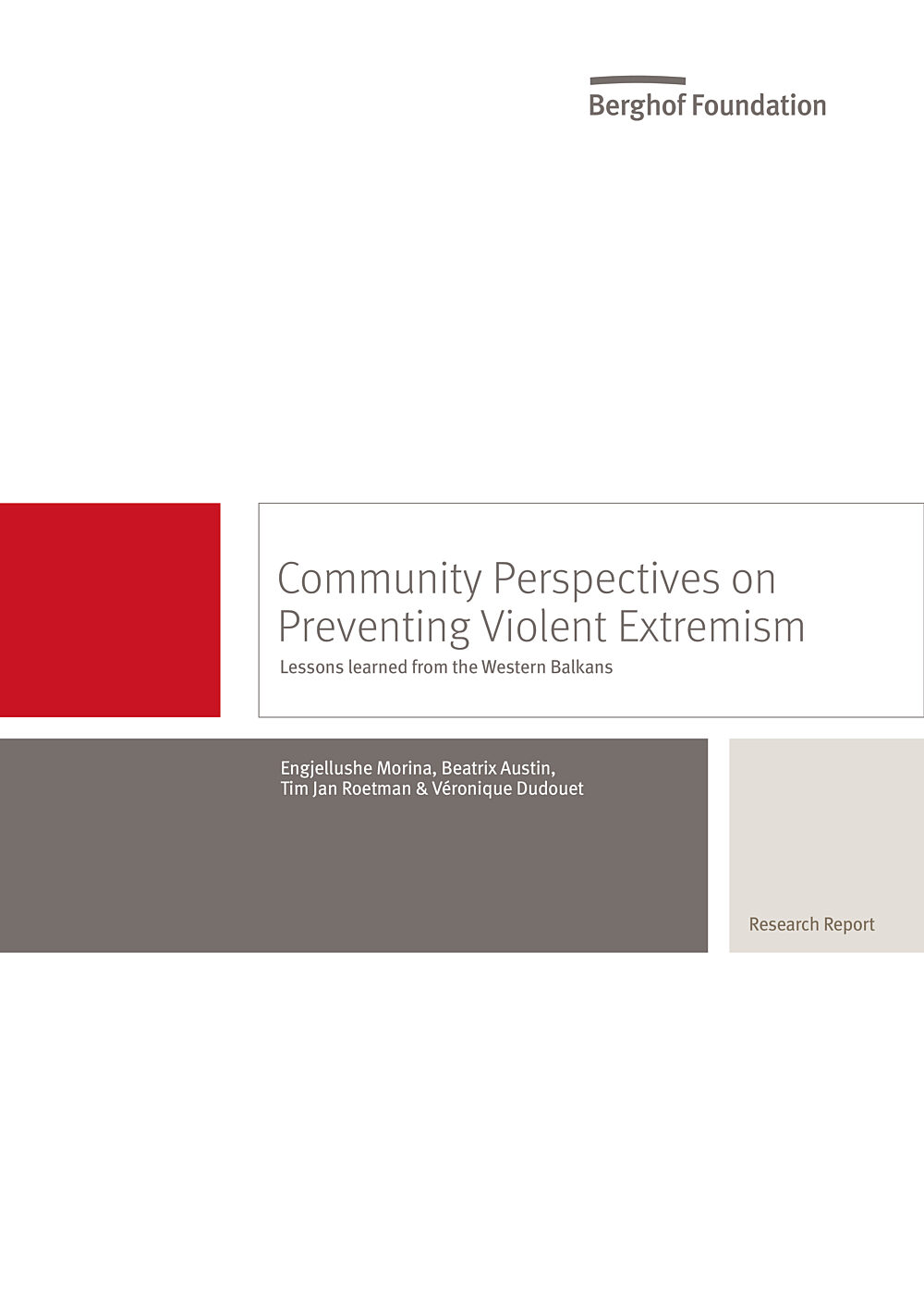
Community Perspectives on Preventing Violent ExtremismLessons learned from the Western Balkans
This comparative synthesis report – building on four country case studies covering Albania, Bosnia and Herzegovina, Kosovo and Macedonia – was produced in the framework of a participatory research project on “Opportunities for Preventing Violent Extremism in the Western Balkans”. Together with with four local research partners, we explore why some communities are particularly affected by individuals inspired by and/or joining the Islamic State (IS) or similar violent extremist groups, while other communities may show greater resilience to the same phenomenon. The project also includes policy outreach activities, both nationally and internationally, as well as local dialogue initiatives, in cooperation with local stakeholders and affected communities, in order to explore and develop strategies to prevent violent radicalisation in the Western Balkans in light of the research findings.
- Year2019
- Author(s)Engjellushe Morina, Beatrix Austin, Tim Jan Roetman, Véronique Dudouet
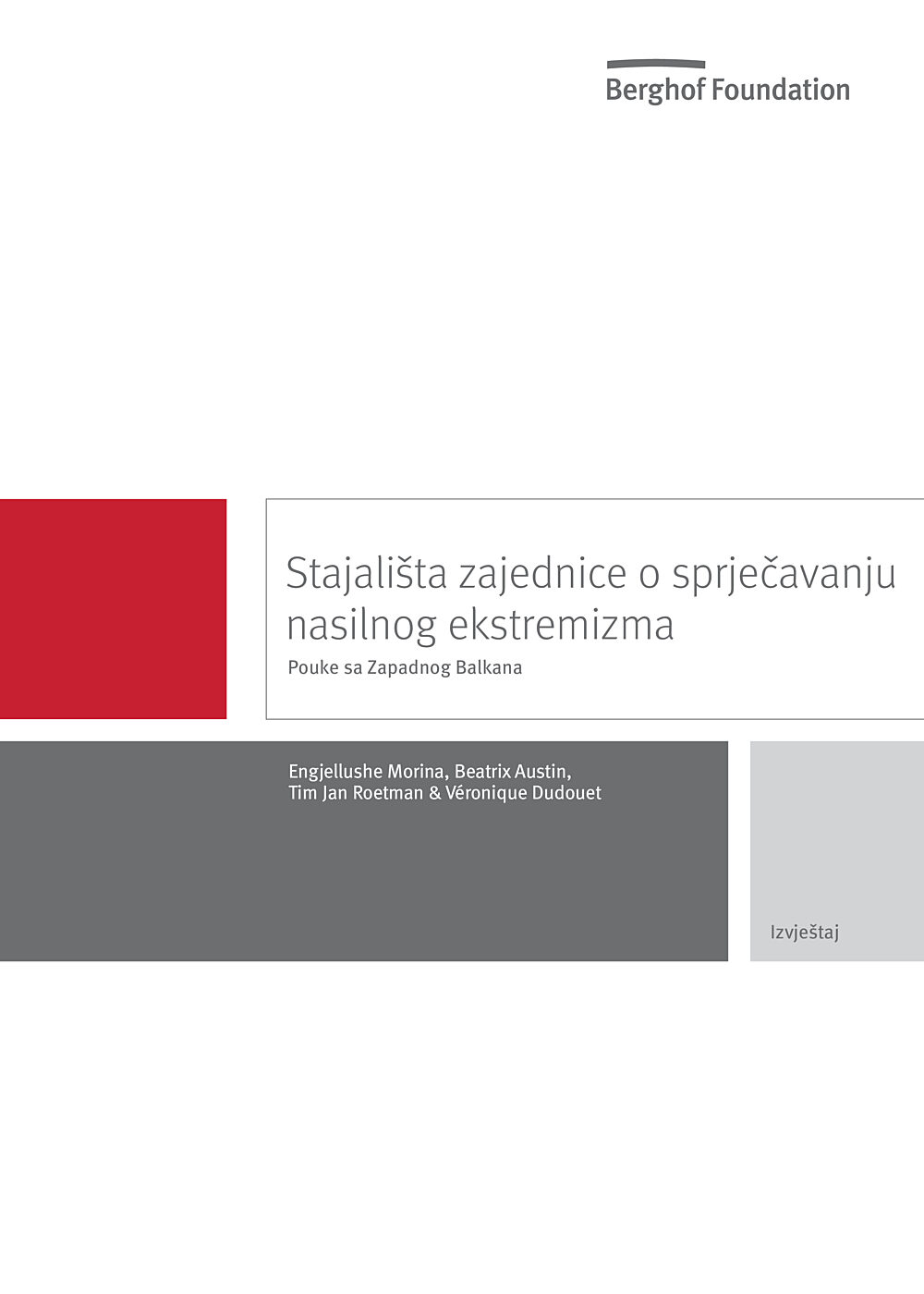
Stajališta zajednice o sprječavanju nasilnog ekstremizmaPouke sa Zapadnog Balkana
Ovaj komparativni konsolidirani izvještaj, koji se temelji na četiri studije slučaja koje pokrivaju Albaniju, Bosnu i Hercegovinu, Kosovo i Makedoniju, izrađen je u okviru participatornog istraživačkog projekta nazvanog „Prilike za sprječavanje nasilnog ekstremizma na Zapadnom Balkanu”. Zajedno sa četiri lokalna istraživačka partnera, ispitivali smo zašto u nekim zajednicama ima mnogo pojedinaca koje inspirira Islamska država (IS) ili koji se pridružuju njoj ili sličnim ekstremističkim grupama, dok druge zajednice pokazuju veću otpornost na tu istu pojavu. Projektom su bile obuhvaćene i aktivnosti prikupljanja podataka od relevantnih aktera neophodnih za formuliranje politika, u zemlji i na međunarodnom novu, kao i lokalne inicijative za pokretanje dijaloga, u saradnji sa lokalnim akterima i pogođenim zajednicama, da bi se ispitale i razvijale strategije za sprječavanje nasilne radikalizacije na Zapadnom Balkanu u kontekstu nalaza ovog istraživanja.
- Year2019
- Author(s)Engjellushe Morina, Beatrix Austin, Tim Jan Roetman, Véronique Dudouet
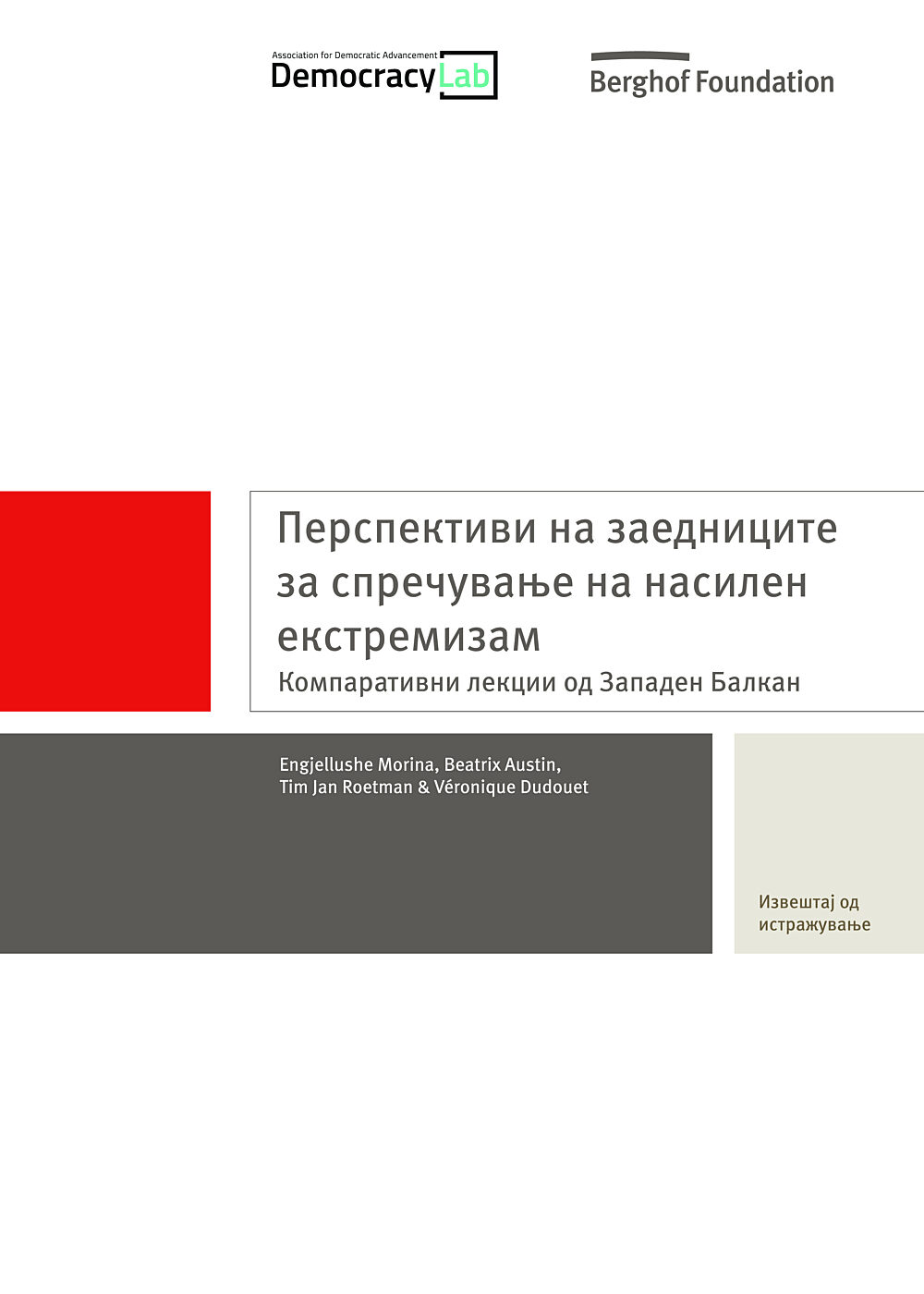
Перспективи на Заедницата за Спречување на Насилен ЕкстремизамКомпаративни лекции од Западен Балкан
Овој компаративен извештај нуди сознанија од заеднички истражувачки проект, комбиниран со иницијативи за дијалог со заедницата, спроведени во 2017/18 год. во четири земји од Западен Балкан: Албанија, Босна и Херцеговина, Косово и Македонија. Разбирливо, четирите земји вклучени во студијата имаат многу сличности кои се вкоренети во заедничките историски незадоволства, но исто така се поврзани со неразвиени економии, лошо владеење и административна дисфункционалност, национални и етнички тензии и нерешени прашања со идентитетот. Истражувачкиот проект се фокусираше на мезо ниво и се обидe да ги идентификува факторите на ранливост и отпорност на заедницата на насилниот екстремизам и да ги формулира и тестира препораките изготвени од градењето на мирот за делотворно спречување на насилен екстремизам (СНЕ). Со цел откривање и разбирање на она што ги прави заедниците отпорни на насилниот екстремизам, истражувачите ги анализираа карактеристиките на заедниците во одреден социо-економски, идеолошки и политички контекст.
- Year2019
- Author(s)Engjellushe Morina, Beatrix Austin, Tim Jan Roetman, Véronique Dudouet
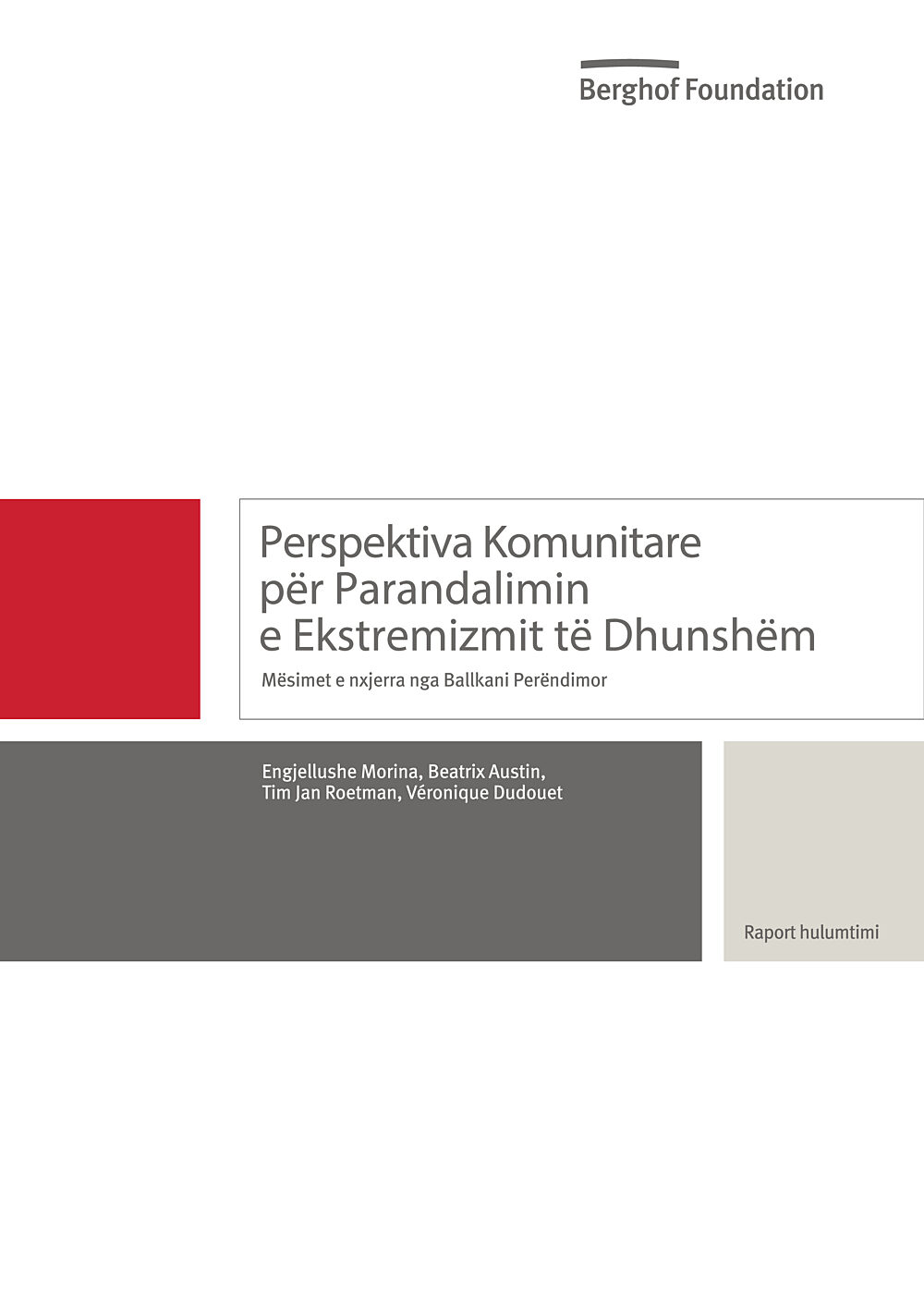
Perspektivat Komunitare për Parandalimin e Ekstremizmit të DhunshëmMësimet e nxjerra nga Ballkani Perëndimor
Ky raport krahasues, i bazuar në katër raste të ndryshme studimore në Shqipëri, Bosnjë dhe Hercegovinë, Kosovë dhe Maqedoni, u zhvillua në kuadër të projektit kërkimor “Mundësitë për Parandalimin e Ekstremizmit të Dhunshëm në Ballkanin Perëndimor”. Së bashku me katër partnerë hulumtues vendorë, në këtë raport shqyrtojmë pse disa komunitete janë veçanërisht të ndikuar nga individë që frymëzohen apo bëhen pjesë e Shtetit Islamik apo të grupeve të ngjashme të ekstremizmit të dhunshëm, ndërkohë që komunitete të tjera janë më të qëndrueshme ndaj të njëjtit fenomen. Në këtë projekt janë realizuar edhe diskutime me komunitetet, si në vend ashtu edhe në rang ndërkombëtar, si dhe nisma dialogu në nivel vendor në bashkëpunim me aktorët vendorë dhe komunitetet përkatëse për të shqyrtuar dhe hartuar strategji me qëllim parandalimin e radikalizimit të dhunshëm në Ballkanin Perëndimor nën dritën e gjetjeve të këtij hulumtimi.
- Year2019
- Author(s)Engjellushe Morina, Beatrix Austin, Tim Jan Roetman, Véronique Dudouet
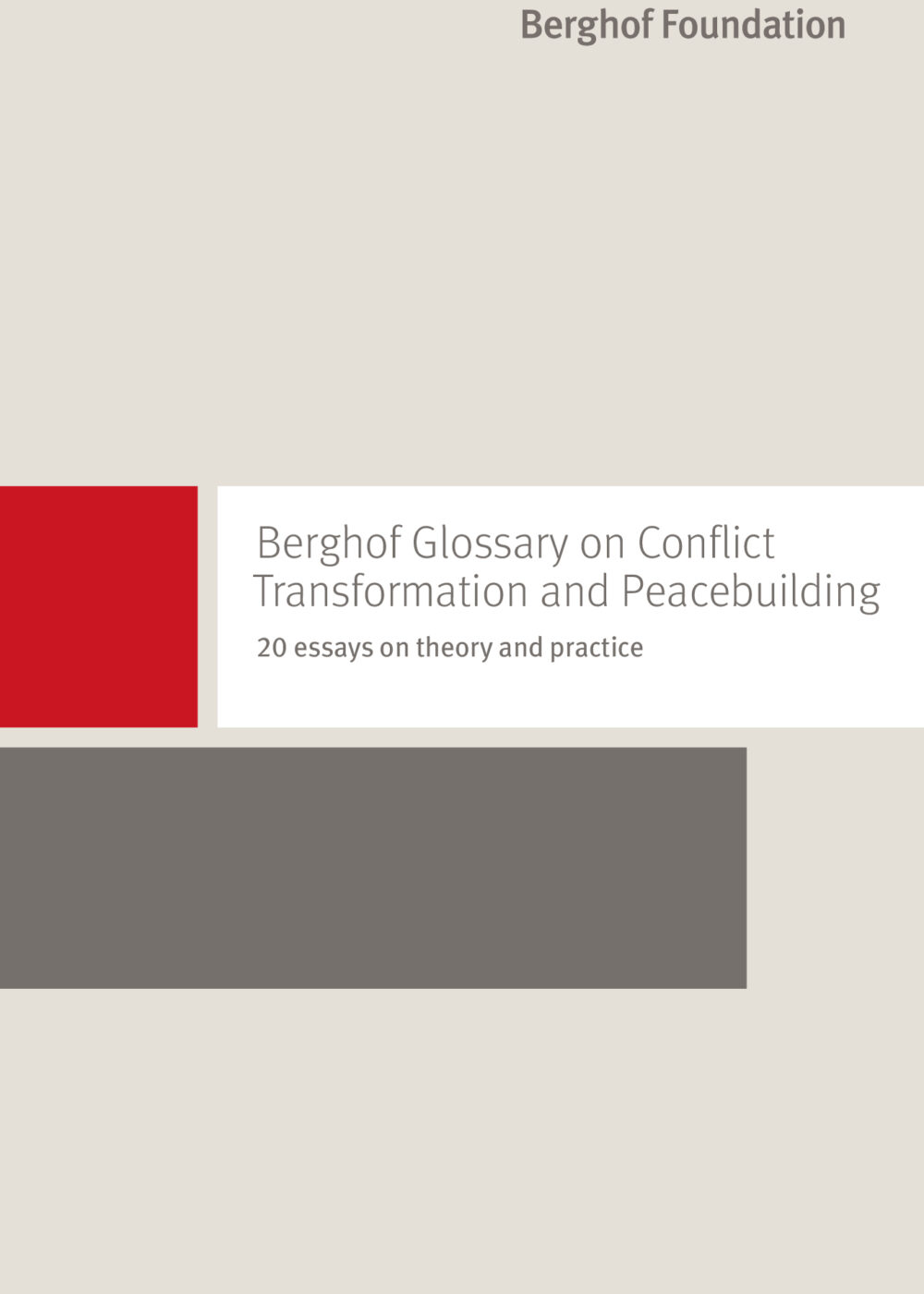
Berghof Glossary on Conflict Transformation20 Notions for Theory and Practice
The 2019 edition of the Berghof Glossary revisits the main principles and approaches that we use in our work to support people and conflict parties around the world. For a second time, our team has embarked on a joint exploration in order to chart a shared understanding of what it takes to create “space(s) for conflict transformation”.
- Year2019
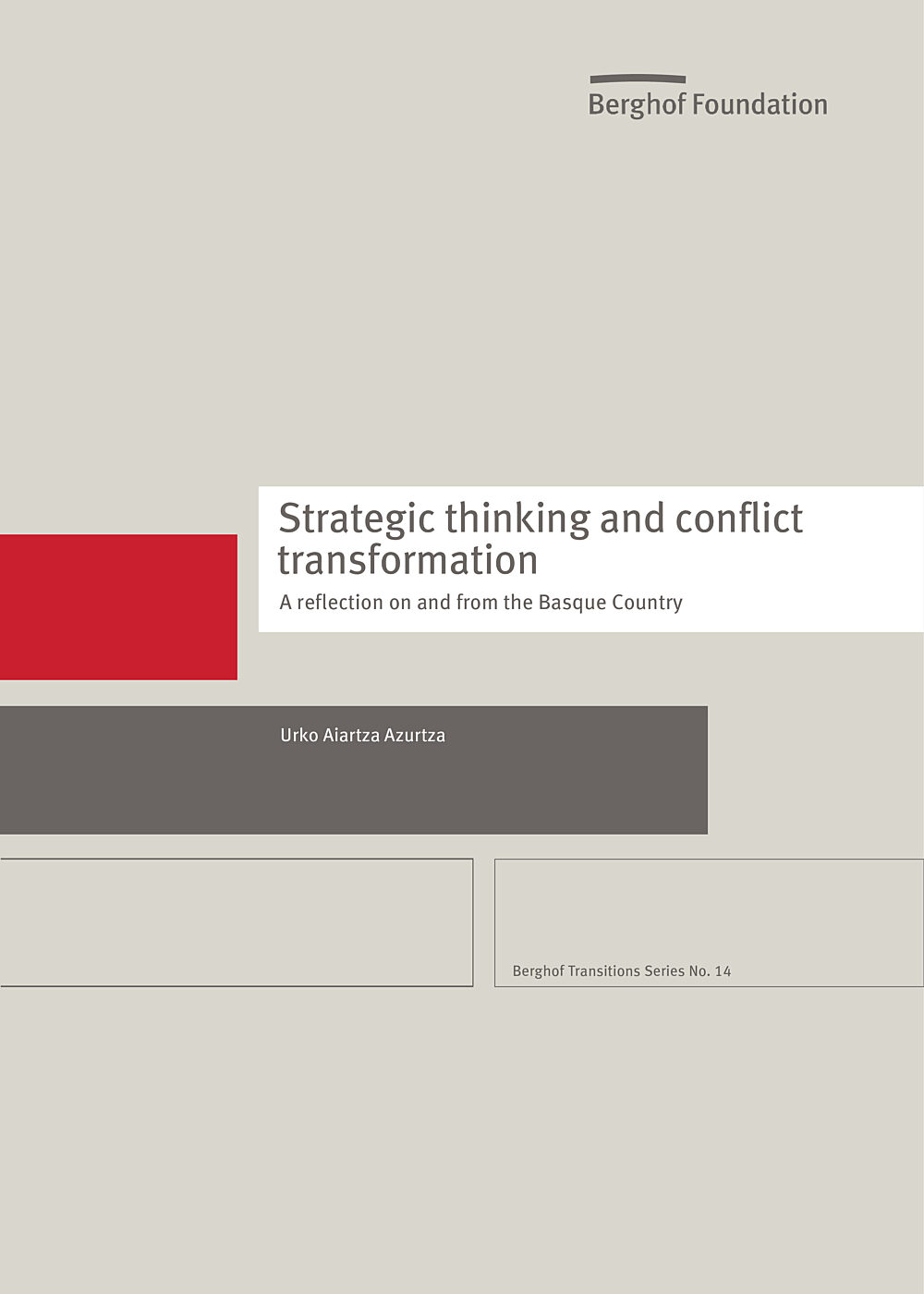
Strategic thinking and conflict transformation: A reflection on and from the Basque CountryTransitions Series No. 14
The disarmament and dissolution of the Basque separatist group Euskadi Ta Askatasuna, better known under its acronym ETA, is a unique example of a creative and unilateral transition to end armed conflict. After the collapse of the negotiation process between the Spanish government and ETA in 2006, an internal debate within the Basque pro-independence movement led to a change of strategy. The new direction eventually resulted in the disarmament and dissolution of ETA in May 2018. How did it come about and what lessons can be drawn from this case for other conflicts? This report looks at these questions in detail, based on in-depth interviews with actors who took part in this democratic transition process as well as on the direct involvement and experiences of the author himself. Urko Aiartza previously coauthored another Transition Series report on the Basque peace process, covering the 1958-2007 period and the various attempts at negotiation between ETA and the Spanish Government (Aiartza and Zabalo 2009).
- Year2019
- Author(s)Urko Aiartza Azurtza
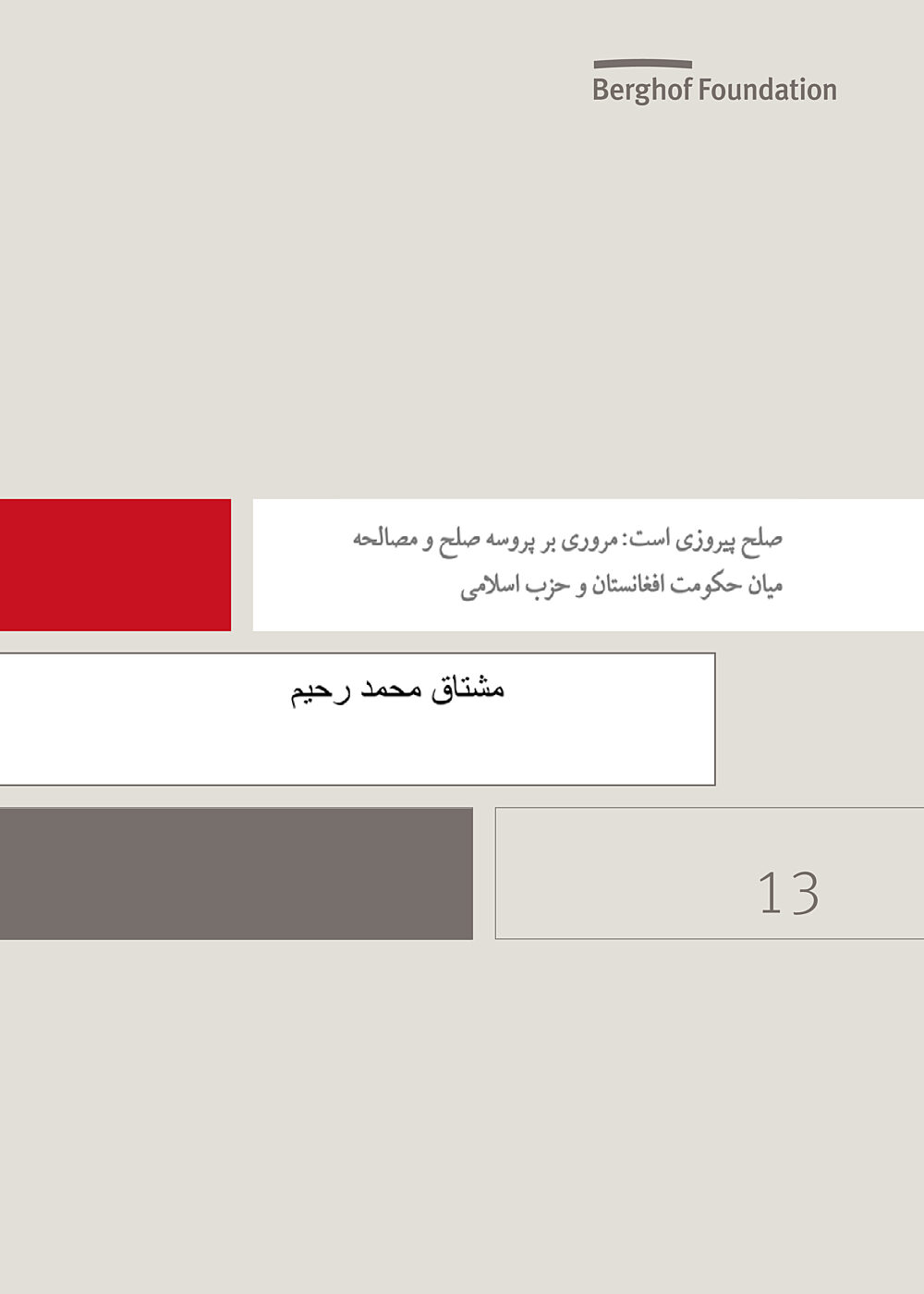
صلح پیروزی استمروری بر پروسه صلح و مصالحه میان حکومت افغانستان و حزب اسلامی
این گزارش تلاشهای صلح و مصالحه دولت افغانستان با حزب اسلامی را مورد تحلیل و بررسی قرار میدهد. عوامل میسر کننده و محدودیت ها را شناسایی نموده، توافقات بدست آمده و تطبیق آنها و همچنان تجارب بدست آمده را که میتواند در مذاکرات صلح در آینده از آن استفاده بعمل آید، مورد تحلیل قرار داده است. حزب اسلامی منحیث یک حزب در سالهای دهه ۱۹۷۰ به هدف ایجاد حکومت اسلامی تأسیس گردیده است. حزب اسلامی منحیث یک گروه اصلی جهادی در مراحل مختلفه منازعه- چون مبارزه با نیروهای متجاوز اتحاد جماهیر شوروی و رژیم تحت الحمایه آن در سالهای ۱۹۸۰ ،جنگ های داخلی در سالهای ۱۹۹۰ ،جنگ با طالبان جهت کنترول مناطق و بعد از سال ۲۰۰۱ و سقوط رژیم طالبان در جنگ با حکومت افغانستان و نیروهای بین المللی حمایت کننده آن- نقش داشته است.
- Year2019
- Author(s)Mushtaq Muhammad Rahim